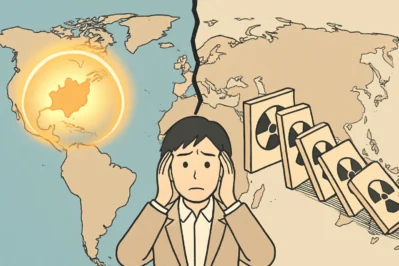Beyond the Headlines: Discussing Nuclear Issues in Korean
Hello! It’s your friendly guide to leveling up your Korean, Daily Hangul!
Ready to move beyond everyday conversation and into the world of intellectual discourse? Today, we’re tackling a weighty but fascinating topic: the issue of nuclear proliferation and the future of the non-proliferation system. This vocabulary is essential if you want to understand Korean news, participate in academic discussions, or simply grasp the nuances of the geopolitical conversations happening in Korea today.
Lately in Korea, with the ever-present geopolitical tensions, the debate around national security and nuclear capability has resurfaced in public discourse. You’ll hear the terms we’re learning today on news channels, in political debates, and in serious newspaper columns. Mastering them will give you a powerful tool to understand the complex realities of modern Korea.
Let’s dive in!
Core Expressions for Global Debates
Here are some key terms you need to know to discuss this complex topic like an expert.
1. 핵확산 (核擴散)
* Pronunciation [Romanized]: Haek-hwak-san
* English Meaning: Nuclear Proliferation
* Detailed Explanation: This is the direct, formal term for the spread of nuclear weapons to nations that are not recognized as “nuclear weapon states.” It’s a compound of 핵 (haek), meaning “nuclear,” and 확산 (hwak-san), meaning “proliferation” or “spread.” You will see this word constantly in news articles and academic papers about international security.
2. 억지력 (抑止力)
* Pronunciation [Romanized]: Eok-ji-ryeok
* English Meaning: Deterrence / Deterrent Force
* Detailed Explanation: This is a crucial concept in military and political strategy. It refers to the power to discourage an opponent from taking an action through the threat of retaliation. In the context of our topic, it’s often used as 핵 억지력 (haek eok-ji-ryeok), meaning “nuclear deterrence.” It’s a formal, strategic term used in serious discussions.
3. 비확산 체제 (非擴散 體制)
* Pronunciation [Romanized]: Bi-hwak-san che-je
* English Meaning: Non-proliferation regime
* Detailed Explanation: This refers to the international system of treaties and agreements, like the Nuclear Non-Proliferation Treaty (NPT), designed to prevent the spread of nuclear weapons. 비 (bi) is a prefix meaning “non-,” 확산 (hwak-san) is “proliferation,” and 체제 (che-je) means “system” or “regime.” Using this term shows a deep understanding of the international framework.
4. 딜레마에 빠지다
* Pronunciation [Romanized]: Dillema-e ppajida
* English Meaning: To fall into a dilemma; to be in a predicament.
* Detailed Explanation: While “dilemma” is a loanword, this entire phrase is a very natural and common way to express being in a difficult situation with no easy solution. 빠지다 (ppajida) literally means “to fall into,” so the expression creates a vivid image of being trapped in a difficult choice. It’s perfect for describing the complex choices nations face regarding security.
Example Dialogue
Let’s see how these expressions might appear in a conversation between two university students, Min-jun and Su-jin, after watching a news documentary.
A (Min-jun): 요즘 국제 정세를 보면 핵확산 문제가 정말 심각한 것 같아. 비확산 체제가 잘 작동하고 있는 건지 의문이야.
(Yo-jeum guk-je jeong-se-reul bo-myeon haek-hwak-san mun-je-ga jeong-mal sim-gak-han geot ga-ta. Bi-hwak-san che-je-ga jal jak-dong-ha-go it-neun geon-ji ui-mun-i-ya.)
A (Min-jun): Looking at the international situation these days, the nuclear proliferation problem seems really serious. I doubt the non-proliferation regime is working properly.
B (Su-jin): 맞아. 일부 국가에서는 자체적인 억지력을 가져야 한다는 목소리도 커지고 있잖아.
(Ma-ja. Il-bu guk-ga-e-seo-neun ja-che-jeok-in eok-ji-ryeok-eul ga-jyeo-ya han-da-neun mok-so-ri-do keo-ji-go it-jan-a.)
B (Su-jin): Right. In some countries, the argument that they need their own deterrent force is growing louder.
A (Min-jun): 안보를 생각하면 이해가 가면서도, 그게 또 다른 확산을 부를 수 있으니… 정말 딜레마에 빠지게 되는 문제야.
(An-bo-reul saeng-gak-ha-myeon i-hae-ga ga-myeon-seo-do, geu-ge tto da-reun hwak-san-eul bu-reul su i-sseu-ni… jeong-mal dillema-e ppajige doe-neun mun-je-ya.)
A (Min-jun): I can understand it from a security perspective, but that could also trigger further proliferation… It’s a problem that truly puts you in a dilemma.
B (Su-jin): 응, 그래서 요즘 한국에서도 이 주제가 다시 공론화되고 있는 거지. 신문 기사마다 이 얘기야.
(Eung, geu-rae-seo yo-jeum han-guk-e-seo-do i ju-je-ga da-si gong-ron-hwa-doe-go it-neun geo-ji. Sin-mun gi-sa-ma-da i yae-gi-ya.)
B (Su-jin): Yeah, that’s why this topic is becoming a subject of public debate again in Korea these days. It’s in every newspaper article.
Culture Tip & Trend Deep Dive
In South Korea, the discussion around nuclear weapons isn’t just an abstract foreign policy issue; it’s a deeply felt domestic one. Due to the unique geopolitical situation on the Korean Peninsula, the debate over whether South Korea should develop its own nuclear weapons (자체 핵무장론 – jache haengmujangnon) is a recurring theme.
When you see this topic being 공론화되다 (gong-ron-hwa-doeda), you’ll find commentators and citizens fiercely debating the pros and cons. Proponents argue for a stronger 억지력 (eok-ji-ryeok) against regional threats, while opponents worry about violating the 비확산 체제 (bi-hwak-san che-je) and the potential for a regional arms race.
Understanding these terms allows you to not only read the news but to grasp the underlying anxieties and strategic thinking that shape modern Korean society. You can now follow high-level TV debates (시사 토론 프로그램) and understand the core of the arguments being made.
Let’s Practice!
Time to put your new knowledge to the test!
- Fill in the Blank: A country might argue it needs nuclear weapons for self-defense, believing they provide a powerful __________.
(Hint: A force to discourage attack) -
Sentence Building: Using the phrase 딜레마에 빠지다, write a short sentence in Korean about a difficult choice (it doesn’t have to be about politics!).
Great job today tackling such a challenging but rewarding topic! You’ve taken a huge step toward fluency in professional and academic Korean.
Now, try using one of today’s expressions in the comments below! Share your thoughts on this topic or try the practice exercises. I’d love to see what you come up with!






